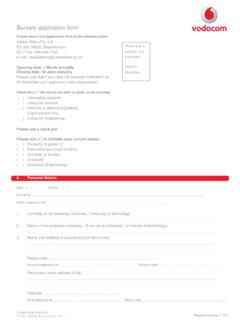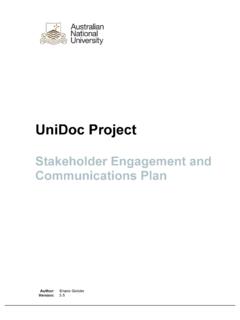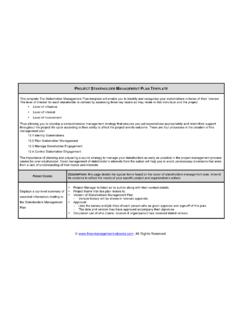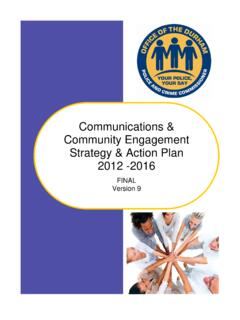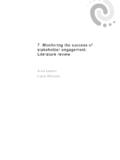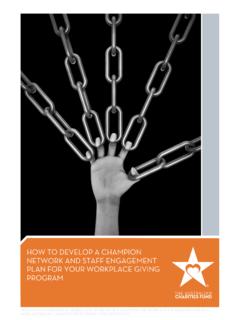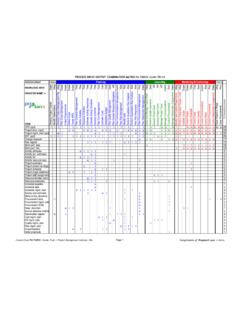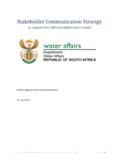Transcription of Stakeholder report - Vodacom
1 1 Vodacom Group Limited Integrated report for the year ended 31 March 13 Stakeholder reportThis year, guided by our Stakeholder engagement framework, we continued with our standing commitment to build and manage our engagements with all our stakeholders, defined as the individuals, groups of individuals or organisations that affect and/or could be affected by our activities, products or services and associated performance. Our interactions demonstrate our readiness to engage with all stakeholders, especially government to ensure that our activities and key interventions are aligned to their national development with stakeholders Across all markets Vodacom identified a number of key issues and regulations that policy makers and regulators intended to implement and duly executed engagement plans to ensure ongoing discussions to manage the anticipated impact on the business:South AfricaThe key topics in engagements with policy makers included the need to increase broadband access, the national broadband policy discussions and spectrum allocation.
2 Vodacom chaired the Investment in ICT work stream of the Department of Communications Vision 2020 process, geared towards achieving 100% broadband coverage and job creation in the ICT sector. After the National Planning Commission ( NPC ) presented its final report on the National Development Plan ( NDP ) to the President and Parliament in August 2012, Vodacom began exploring ways it can contribute to the NDP and make its vision a reality. To date, we have engaged the NPC and government to achieve select objectives in education, health, women and youth security. TanzaniaThe key issues that we engaged government and regulatory stakeholders on ranged from subscriber registration, mobile number portability, mobile payments regulations, universal service and spectrum most important issues for engagement included mobile termination rates, spectrum planning, management and policy, telecommunications policy updates and telecoms-specific fees and key areas for engagement with authorities were the new draft strategy for the telecommunications sector, mobile termination rates, site sharing between network operators.
3 Spectrum auction and the launch of Vodacom significant topics in engagements with the regulator were our operating licence renewal, cross border coverage spillage and Engaging with stakeholders3 Key issues that concern our stakeholders and how we responded4 Managing and building our reputation5 Who keeps us in business2 Stakeholder report continuedFuture AgendaAs part of our programme to engage with stakeholders, we continued with our Future Agenda Seminar series aimed at creating an objective platform to discuss trends, future challenges and the importance of mobile technologies. The programme provides an open forum for discussions on how to address the major challenges and trends that will affect society over the next few years.
4 The sessions are, on average, attended by approximately 60 participants that are a mix of policy makers, government representatives, academics and we launched the programme last year, we have hosted six sessions. This year, the two sessions explored the Future of Agriculture and the Future of Privacy . The Future of Agriculture session examined Vodafone s Connected Agriculture research that investigated the role of mobile technologies in driving efficiency and sustainability in the food and agriculture value chain. The report s main message is that mobile telephony has significant potential to improve efficiency of the agriculture sector by delivering information relevant to farmers, such as agricultural techniques, commodity prices and weather forecasts, where traditional methods of communication are limited.
5 The session participants included representatives of the National Department of Agriculture, Forestry and Fisheries, Agricultural associations, academics and the Future of Privacy session studied the Protection of Personal Information Bill and other related legislation that presented new opportunities and challenges for customers, individuals and businesses. The session was hosted in partnership with the Department of Communications, the Centre of Excellence and Information Ethics of the University of Pretoria, and the Films and Publications AssociationConsultations to establish a new voluntary telecommunications network operators association have been slow.
6 Even so, all key telecommunications industry stakeholders support the establishment of an entity that will constructively engage with policy makers and the regulator on pronouncements and developments in the policy and regulatory spheres as well as promote further investment and development of the communications sector in South South Africa s socioeconomic impactLate last year we commissioned Economics Information Services to assess and document the broader social and economic contribution Vodacom has made to South Africa between 2006 and 2011. The intention was to retrospectively measure Vodacom South Africa s impact and contribution to the economy as an operator supporting economic transformation, an employer and a corporate citizen.
7 The research was completed in mid-2013 financial year and will guide our ongoing efforts to align current and future activities to support government highlights from the research indicate that: Vodacom contributed an estimated R358 833 million to the South African economy over the last five years. The total jobs created by Vodacom are estimated to have fluctuated between 168 415 in 2011 and 200 943 in 2009. Total taxes paid by Vodacom , which are the sum of direct plus indirect taxes, increased from R6 777 million in 2007 to R9 873 million in 2011. Over the five years cumulative total taxes were estimated at R43 509 million. Total CSI spending between April 1999 and January 2012 amounted to R642 million.
8 This includes R523 million by the Vodacom Foundation, R117 million by other divisions and million in payroll giving. Vodacom s Community Services project exceeded the license obligation to roll out 22 000 community based telephones ( CSTs ), surpassing the mark by 100 000 to reach approximately 120 000 CSTs by 31 March 2012, significantly contributing to enterprise development. The company contributed 3% of net profit after tax (calculated cumulatively over five years) towards BBBEE. This totalled over R405 million in 2008 reaching R1 640 million in Group Limited Integrated report for the year ended 31 March 13 Key issues that concern our stakeholders and how we respondedAccess to communicationsTo expand access into remote areas, we continued our work with suppliers to build networks that function effectively at low cost.
9 We also added more value to our offerings, both in voice and data of servicesThe cost of accessing communications services is an ongoing concern. We have taken steps to simplify our offers and proactively added value to our voice and data the sustainability of small, medium and micro enterprises ( SMMEs )We understand the impact that a delay in payment for services rendered has on the sustainability of SMMEs. To address this we initiated a programme through which we commit to paying qualifying black owned enterprises within 15 days of receiving goods and and localisationWe see greater race, gender, age, culture and religious diversity as strengths that help us understand and serve our customers better.
10 Sharing infrastructureSharing infrastructure is a good way for all players in our industry to lower our environmental impacts and costs. We share infrastructure wherever possible and in South Africa we currently share more than half of our sites with other our customersWe have a range of policies and measures in place to protect our customers, their information and privacy. Over and above our compliance with the Consumer Protection Act, we have pre-emptively evaluated the possible impact of the Protection of Personal Information Bill and have geared for compliance once the Act is fields Some of our customers continue to have concerns about the potential health effects of electromagnetic fields ( EMF ) that mobile phones use to send and receive information.





